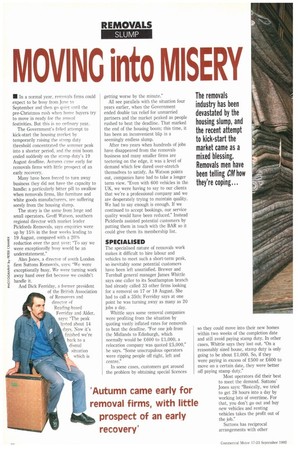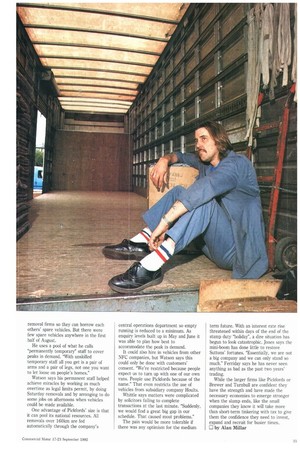MOVING into MISERY
Page 34

Page 35

If you've noticed an error in this article please click here to report it so we can fix it.
• In a normal year, removals firms could expect to be busy from June to September and then go quiet until the pre-Christmas rush when home buyers try to move in ready for the annual festivities. But this is no ordinary year.
The Government's failed attempt to kick-start the housing market by temporarily raising the stamp duty threshold concentrated the slimmer peak into a shorter period, and the mini boom ended suddenly on the stamp duty's 19 August deadline. Autumn came early for removals firms with little prospect of an early recovery.
Many have been forced to turn away business they did not have the capacity to handle: a particularly bitter pill to swallow when removals firms, like furniture and white goods manufacturers, are suffering sorely from the housing slump.
The story is the same from large and small operators. Geoff Watson, southern regional director with market leader Pickfords Removals, says enquiries were up by 15% in the four weeks leading to 19 August, compared with a 20% reduction over the past year: "To say we were exceptionally busy would be an understatement."
Alan Jones, a director of south London firm Suttons Removals. says: "We were exceptionally busy. We were turning work away hand over fist because we couldn't handle it.
And Dick Ferriday, a former president of the British Association of Removers and
director of Reading-based Ferriday and Alder, says: 'The peak lasted about 14 days. Now it's finished we're back to a dismal situation which is getting worse by the minute."
All see parallels with the situation four years earlier, when the Government ended double tax relief for unmarried partners and the market peaked as people rushed to beat the deadline. That marked the end of the housing boom; this time, it has been an inconvenient blip in a seemingly endless slump.
After two years when hundreds of jobs have disappeared from the removals business and many smaller firms are teetering on the edge, it was a level of demand which few dared over-stretch themselves to satisfy. As Watson points out, companies have had to take a longer term view. "Even with 600 vehicles in the UK, we were having to say to our clients that we're a professional company and we are desperately trying to maintain quality. We had to say enough is enough. If we continued to accept bookings, our service quality would have been reduced." Instead Pickfords assisted potential customers by putting them in touch with the BAR so it could give them its membership list.
SPECIALISED The specialised nature of removals work makes it difficult to hire labour and vehicles to meet such a short-term peak, so inevitably some potential customers have been left unsatisfied. Brewer and Turnbull general manager James Whittle says one caller to its Southampton branch had already called 33 other firms looking for a removal on 17 or 18 August. She had to call a 35th: Ferriday says at one point he was turning away as many as 20 jobs a day.
Whittle says some removal companies were profiting from the situation by quoting vastly inflated rates for removals to beat the deadline. "For one job from the Midlands to Edinburgh, which normally would be £600 to £1,000, a relocation company was quoted £5,000," he says. "Some unscrupulous operators were ripping people off right, left and centre."
In some cases, customers got around the problem by obtaining special licences
so they could move into their new homes within two weeks of the completion date and still avoid paying stamp duty. In other cases, Whittle says they lost out. "On a reasonably sized house, stamp duty is only going to be about £1,000. So, if they were paying in excess of £500 or £600 to move on a certain date, they were better off paying stamp duty."
Most operators did their best to meet the demand. Suttons' Jones says: "Basically, we tried to get 28 hours into a day by working lots of overtime. For that, you don't go out and buy new vehicles and renting vehicles takes the profit out of the job."
Suttons has reciprocal arrangements with other removal firms so they can borrow each others' spare vehicles. But there were few spare vehicles anywhere in the first half of August.
He uses a pool of what he calls "permanently temporary" staff to cover peaks in demand. "With unskilled temporary staff all you get is a pair of arms and a pair of legs, not one you want to let loose on people's homes."
Watson says his permanent staff helped achieve miracles by working as much overtime as legal limits permit, by doing Saturday removals and by arranging to do some jobs on afternoons when vehicles could be made available.
One advantage of Pickfords' size is that it can pool its national resources. All removals over 160km are fed automatically through the company's central operations department so empty running is reduced to a minimum. As enquiry levels built up in May and June it was able to plan how best to accommodate the peak in demand.
It could also hire in vehicles from other NFC companies, but Watson says this could only be done with customers' consent. "We're restricted because people expect us to turn up with one of our own vans. People use Pickfords because of the name." That even restricts the use of vehicles from subsidiary company Hoults.
Whittle says matters were complicated by solicitors failing to complete transactions at the last minute. "Suddenly, we would find a great big gap in our schedule. That caused most problems."
The pain would be more tolerable if there was any optimism for the medium term future. With an interest rate rise threatened within days of the end of the stamp duty "holiday", a dire situation has begun to look catastrophic. Jones says the mini-boom has done little to restore Suttons' fortunes. "Essentially, we are not a big company and we can only stand so much." Ferriday says he has never seen anything as bad as the past two years' trading.
While the larger firms like Pickfords or Brewer and Turnbull are confident they have the strength and have made the necessary economies to emerge stronger when the slump ends, like the small companies they know it will take more than short-term tinkering with tax to give them the confidence they need to invest, expand and recruit for busier times. 0 by Alan Millar




























































































